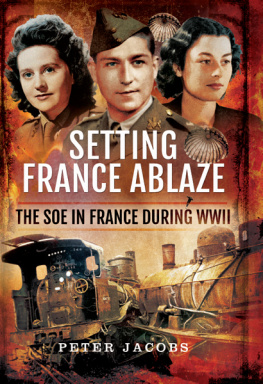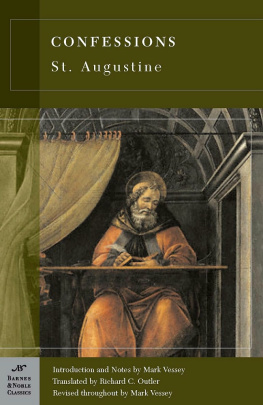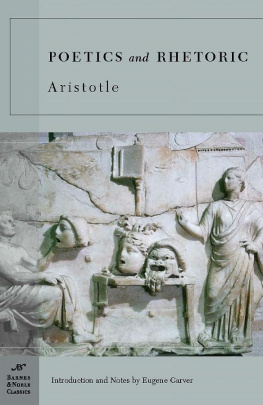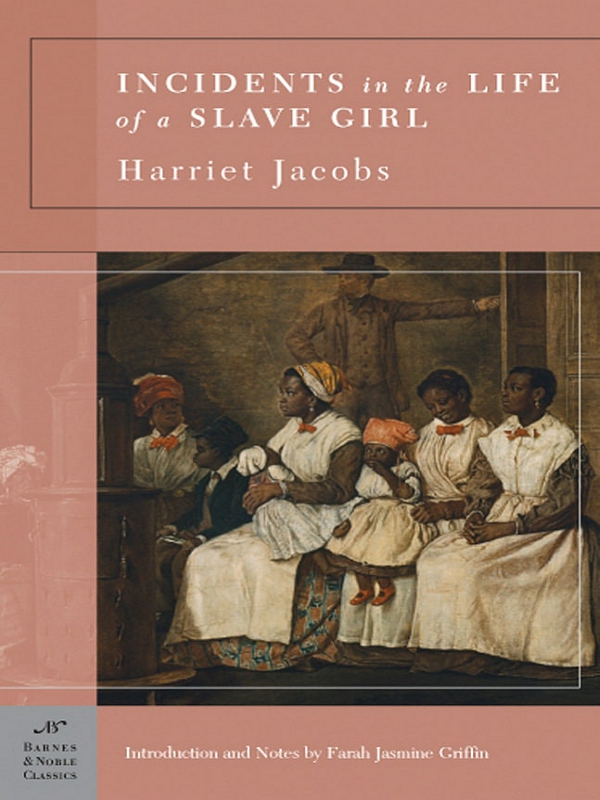
Table of Contents
From the Pages ofIncidents in the Life of a Slave Girl
The slave is sure to know who is the most humane, or cruel master, within forty miles of him.
(page 21 )
By managing to keep within sight of people, as much as possible, during the day time, I had hitherto succeeded in eluding my master, though a razor was often held to my throat to force me to change this line of policy.
(page 39)
But, 0, ye happy women, whose purity has been sheltered from childhood, who have been free to choose the objects of your affection, whose homes are protected by law, do not judge the poor desolate slave girl too severely! If slavery had been abolished, I, also, could have married the man of my choice; I could have had a home shielded by the laws; and I should have been spared the painful task of confessing what I am now about to relate; but all my prospects had been blighted by slavery. I wanted to keep myself pure; and, under the most adverse circumstances, I tried hard to preserve my self-respect; but I was struggling alone in the powerful grasp of the demon Slavery; and the monster proved too strong for me. I felt as if I was forsaken by God and man; as if all my efforts must be frustrated; and I became reckless in my despair.
(page 64)
Pity me, and pardon me, O virtuous reader! You never knew what it is to be a slave; to be entirely unprotected by law or custom; to have the laws reduce you to the condition of a chattel, entirely subject to the will of another. You never exhausted your ingenuity in avoiding the snares, and eluding the power of a hated tyrant; you never shuddered at the sound of his footsteps, and trembled within hearing of his voice.
(pages 65-66)
There is a great difference between Christianity and religion at the south. If a man goes to the communion table, and pays money into the treasury of the church, no matter if it be the price of blood, he is called religious. If a pastor has offspring by a woman not his wife, the church dismiss him, if she is a white woman; but if she is colored, it does not hinder his continuing to be their good shepherd.
(pages 85-86)
I dont belong to you now.
(page 129)
My friends feared I should become a cripple for life; and I was so weary of my long imprisonment that, had it not been for the hope of serving my children, I should have been thankful to die; but, for their sakes, I was willing to bear on.
(page 140)
I said to myself, Surely there must be some justice in man; then I remembered, with a sigh, how slavery perverted all the natural feelings of the human heart.
(page 157)
He saw that I was suspicious, and he said he was sorry, now that he had brought us to the end of our voyage, to find I had so little confidence in him. Ah, if he had ever been a slave he would have known how difficult it was to trust a white man.
(page 174)
Finding I was resolved to stand up for my rights, they concluded to treat me well. Let every colored man and woman do this, and eventually we shall cease to be trampled under foot by our oppressors.
(page 194)
When a man has his wages stolen from him, year after year, and the laws sanction and enforce the theft, how can he be expected to have more regard to honesty than has the man who robs him? I have become somewhat enlightened, but I confess that I agree with poor, ignorant, much-abused Luke, in thinking he had a right to that money, as a portion of his unpaid wages.
(page 210)
Reader, my story ends with freedom; not in the usual way, with marriage.
(page 219)
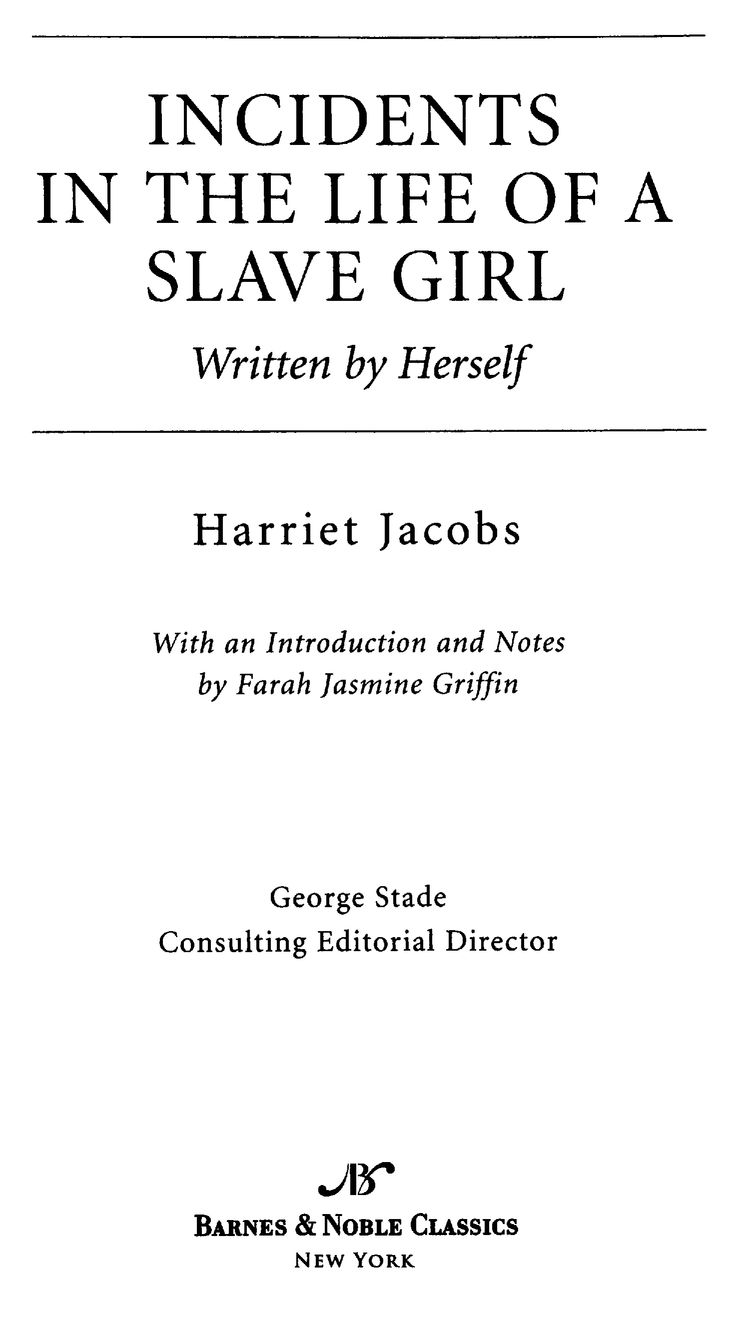
Harriet Jacobs
Harriet Ann Jacobs was born a slave in Edenton, North Carolina, in 1813. As Jacobs would later write, her mother, Delilah, and father, Elijah, fondly shielded her and her younger brother, John S., from the facts of their slave status for at least part of their happy childhoods. Delilah died when Harriet was six, and the young girl went to live with her mothers mistress, Margaret Horniblow, who taught her to read and write. When Margaret died, twelve-year-old Harriet was willed into the household of Dr. James Norcom, by Jacobss later accounts a cruel man who tormented and sexually harassed her throughout her adolescence. At age sixteen, Harriet entered into a sexual relationship with a white neighbor, the future U.S. congressman Samuel Tredwell Sawyer; they had two children, Matilda Louise and Joseph. Sawyer eventually bought the children to protect them from Norcom, and Jacobs went into hiding in her grandmothers house, living in a small, unventilated attic crawl space for seven yearsreading the Bible, sewing, writing, and watching through a hole in the wall as her children played below.
In 1842 Jacobs escaped by boat to the North. While evading the slave catchers Norcom enlisted to capture her, she joined her brother in abolitionist activities in Boston and later Rochester, New York. With the encouragement of the well-known antislavery feminist Amy Post and other sympathetic abolitionists, Jacobs began writing about her experiences as a sexually exploited slave and published them anonymously as letters in the New York Tribune. She published Incidents in the Life of a Slave Girl in the United States in 1861, and in England as The Deeper Wrong in 1862, becoming the first African-American woman to publish her own slave narrative.
After the Civil War, Jacobs and her daughter established the Jacobs Free School in Alexandria, Virginia, and a school and a home for freed slaves in Savannah, Georgia. She wrote about these experiences for the northern press, but her book was not reprinted until a century later, when it found a new readership during the U.S. civil rights movement. Harriet Jacobs died in Washington, D.C., in 1897 and was buried alongside her brother in Mount Auburn Cemetery in Cambridge, Massachusetts.
The World of Harriet Jacobs andIncidents in the Life of a Slave Girl
| 1813 | Harriet Ann Jacobs is born in Edenton, North Carolina. Her mother, Delilah, is the slave of Margaret Horniblow. Her father, Elijah, is the slave of Dr. Andrew Knox and works as a carpenter. |
| 1815 | Harriets brother, John S. Jacobs, is born. |
| 1817 | The American Colonization Society is founded to transport freeborn blacks and emancipated slaves back to Africa. |
| 1819 | Harriets mother, Delilah, dies, and Harriet goes to live with Delilahs mistress, Margaret Horniblow, who teaches her to read and write. |
| 1820 | The Missouri Compromise, which grants Missouri state-hood without restricting the practice of slavery, is passed, bringing the slavery issue to the forefront of national debate. |
| 1821 | The African country of Liberia is founded for the repatriation of former American slaves. |
| 1822 | South Carolina passes the Negro Seamen Act, which, to prevent slave revolts, allows the imprisonment of black sailors while in port. |
| 1825 | Margaret Horniblow dies, and Jacobs is willed as a slave into the household of Dr. James Norcom, who sexually harasses the young girl. |
| 1826 | Jacobss father, Elijah, dies. |
| 1828 | Molly Horniblow, Jacobss grandmother, is freed, and remains in Edenton. |







